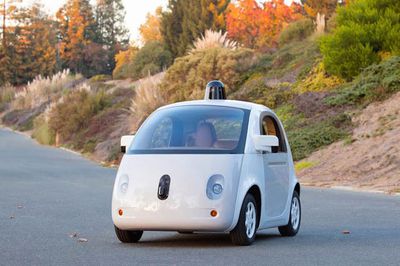Google is reported to have shelved plans to develop its own self-driving vehicle in favor of nurturing partnerships with existing car makers to continue its work in the automotive space.
According to The Information, the company's autonomous car unit, known internally as Chauffeur, is working with established car companies to develop vehicles that will include self-driving features, while ditching earlier plans to remove the steering wheel and pedal controls. The news follows on from reports back in May that Google is actively working with Fiat Chrysler on automotive projects.

Despite the shift in gears for its car project, sources suggest Google still has plans to bring an autonomous taxi service to U.S. roads before the end of 2017. Its autonomous vehicles have already clocked over two million miles of tests on public roads.
Recent reports regarding Apple's ambitions in the autonomous vehicle space appear to have taken a similar hard turn away from developing an own-branded electric car. The Cupertino company is said to have shelved its original automotive program "for now" in favor of building a self-driving software platform, possibly in partnership with existing car makers.
In a letter earlier this month to the U.S. National Highway Traffic Safety Administration, Apple admitted to its interest in "machine learning and automation" as it pertains to transportation, and confirmed its desire to help define rules for the self-driving car industry in the future.





















Top Rated Comments
All tesla has shown is that they can make an electric car. If they can deliver on their orders, that is.
Even their self-driving tech is nowhere near prime time.
The problem with self-drive is that it won't be ready until it can demonstrate that it is virtually infallible. Rational thinking may suggest that it only has to be as good as the average driver to produce a major advance in road safety - but unfortunately, rational thinking won't have much of a role in the public and legal acceptance of self-driving.
For a while, every incident involving a self-driving car is going to be international front-page news. The first court case over a third-party death caused by a self-driving car is going to be a media circus. Adoption of self-driving cars is going to depend on changes in the law on liability and insurance (are you going to get into a self-driving car if you're liable for the consequences of bugs in Tesla/Google/Apple's last software update?)
Reality is, our pathologically risk-averse society has developed an irrational blind spot when it comes to letting a fallible human control a ton of metal hurtling around at 70mph (the accident rate is actually quite low, considering - turns out that ape brains evolved to tarzan through the trees are really good at it). That free pass isn't going to be extended to robots.
I think we're currently at the point where self-parking, lane-keeping, cruise control, auto braking etc. are at the limits of what can safely be done without causing driver complacency. The industry now has to make a quantum leap[1] to a system which allows the driver to kick back and start playing Pokemon - because typical drivers are not going to pay attention to the road and stand ready to intervene while a car drives itself. What we have now is a good proof-of-concept (and maybe a slightly better lane assist) - it still has a long way to go before mass acceptance. There are significant technical challenges and significant cultural/social challenges.
I'm sure it will come eventually, but its not going to be pulling in profits next year.
[1] (in the correct sense of the term - i.e. no intermediate states)
This is just another hollow rant that says exactly nothing at all.